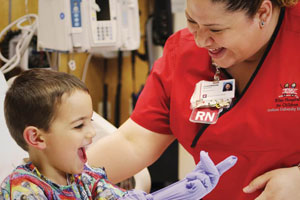
Children with repeated Clostridium difficile (C. diff) infections of the colon have frequent diarrhea, fever and abdominal pain. In many cases, a fecal (stool) transplant can provide relief.
If your child has had three or more C. diff infections, the Fecal Transplant Program at Riley at IU Health can return good bacteria into his or her colon. Normal bowel movements usually begin within two or three days of the transplant.
C. diff infections can happen after your child takes strong antibiotics for any variety of conditions, including other gastrointestinal infections. Antibiotics can destroy the good bacteria in the colon. This allows the C. diff bacteria to multiply. When this happens, a toxin is released that causes diarrhea and other symptoms. A hospital stay is another reason your child may get a C. diff infection, especially if his or her immune system is weakened.
Clostridium difficile can be treated with antibiotics. However, some C. diff spores may survive and can cause repeated infections.
The Fecal Transplant Program at Riley at IU Health is the only one of its kind in Indiana. We serve patients from all parts of Indiana and from Illinois and Kentucky.
Results are very successful, with 91 percent of patients responding after one transplant. For children who need a second fecal transplant, 99 percent get better and have normal bowel movements.
How a Fecal Transplant Works
A fecal transplant uses stool from a healthy donor to put good bacteria back into your child’s infected colon.
Family members are often able to serve as donors. All donors must be healthy and will be tested for certain contagious diseases at least two weeks before the transplant. Tests include:
- Stool tests. These tests will check for C. diff, Helicobacter pylori (H. pylori) and other pathogens (things such as bacteria or viruses that cause disease).
- Blood tests. The donor’s blood will be tested for syphilis, human immunodeficiency virus (HIV) and hepatitis A, B, and C.
Once a donor is approved, he or she must bring a fresh stool sample the morning of the procedure. The stool is processed into a liquid. It is then placed into your child’s colon. Physicians use different methods to perform the transplant, including:
- Colonoscopy
- Nasogastric (NG) tube into the small intestine
- Rectal enema
- Upper endoscopy
Some donor samples are also available from a universal donor bank in Boston. If a relative or other local donor cannot be found, the Fecal Transplant Program can order a processed and prepared frozen donor sample from donors who have already been screened.
Conditions & Services
Conditions Treated
We treat most Fecal Transplant conditions. Below is more information about some, but not all, of the conditions that we treat.
Services Offered
We offer a number of different Fecal Transplant services. Below are some, but not all, of the services that we provide. If you have a question about a specific service that is not listed here, please contact our program.
Doctors and Locations
Doctors
The care your child receives through the Fecal Transplant Program is managed by our specialized pediatric gastroenterologists.
Locations
Locations
In addition to our primary hospital location at the Academic Health Center in Indianapolis, IN, we have convenient locations to better serve our communities throughout the state.
Riley Pediatric Gastroenterology, Hepatology & Nutrition
11725 N. Illinois St.
Carmel, IN 46032
Riley Pediatric Gastroenterology, Hepatology & Nutrition
575 Riley Hospital Dr.
Indianapolis, IN 46202
Program Forms & Resources
Program Forms & Resources
Riley Children's Health provides the following forms for parents, healthcare providers and personnel. We have also curated relevant resources from other websites and provided links with brief descriptions of the information that is available.
Resources
-
Common Questions From Parents (Riley at IU Health)
This document provides answers to the most common questions the Fecal Transplant Program receives from parents and caregivers.
-
This website for children and parents is maintained by the North American Society for Pediatric Gastroenterology, Hepatology and Nutrition. This group provides information about many gastrointestinal conditions and treatments, including Clostridium difficile infections.
-
North American Society for Pediatric Gastroenterology, Hepatology and Nutrition Foundation
This group sponsors research into new treatments and cures, such as fecal transplants, for children and young adults.
Related Departments
Related Departments
We provide multispecialty care for a number of conditions. Below are links to our related departments.
Health Professionals
For Health Professionals
The physicians at the Fecal Transplant Program at Riley at IU Health work with pediatric gastroenterologists across Indiana and other states to treat repeated C. diff infections in children.
Refer A Patient

Riley at IU Health works with referring physicians in Indiana and beyond.
Refer A PatientEducation
The Gastroenterology Department at Riley at IU Health partners with the Indiana University School of Medicine to provide excellent training opportunities for medical students, residents and fellows.

